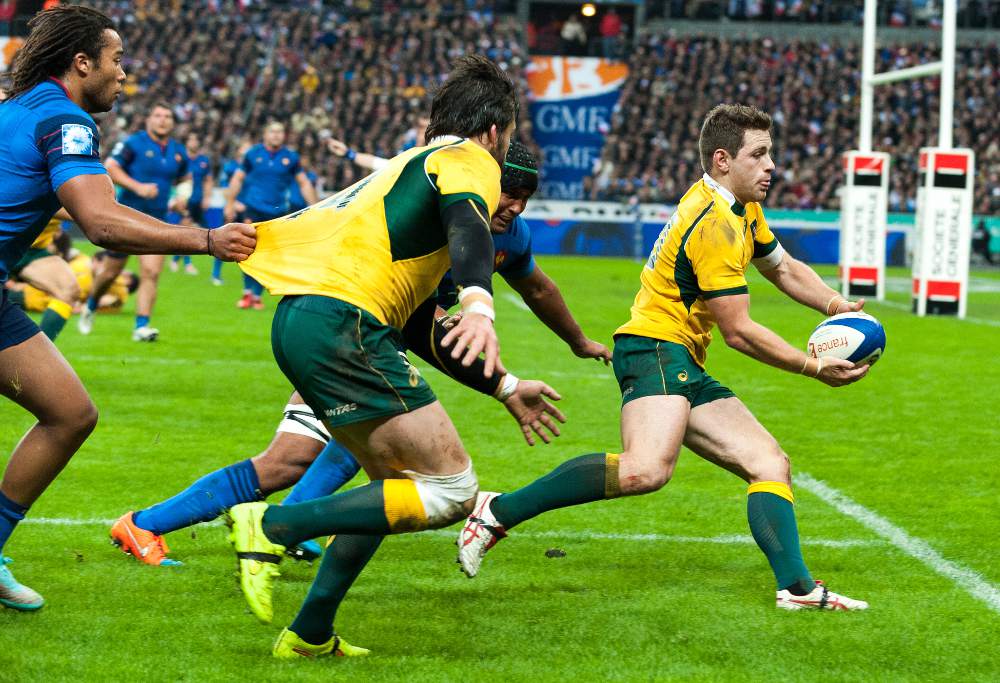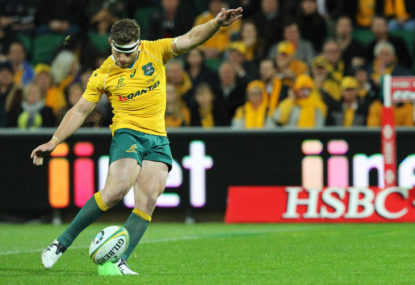As Bernard Foley’s try saw the Wallabies jump out to their 22-point lead early in the second half, my thoughts went straight to the ‘What changes would you make?’ post-mortems that have followed Wallabies Tests this season.
For the first time in I can’t remember how long, I honestly can’t think of any changes I would want to make to the side that beat Wales 32-8 in Cardiff. And more is the point, the Wallabies XV that started the game at the Millennium deserve to hold their place for the Murrayfield Test against Scotland next weekend.
The Wallabies’ schedule this Spring is just about perfect. Wales have given them a really good hitout to kick the tour off, and Scotland and France will provide the perfect opportunity to tune-up before taking on Ireland and England to finish the tour.
On the display in Cardiff, and even with Ireland recording their outstanding and historic win over New Zealand in Chicago, the Wallabies now have to take the mindset that there isn’t any reason why they can’t go into the final Test at Twickenham unbeaten.
Some Wallabies played better than others, but that’s not to say any of them were poor. And that’s where I’m coming from in saying I’d quite like to see an unchanged XV named for next weekend’s Test against the Scots.
David Pocock was said to be fuming when he failed a concussion test at halftime, and even if he sails through the return to play protocols this week, you do wonder if he might sit the game out anyway. The Scotland game is probably the opportunity to get some game time into other players in the squad, too, and as much as I’d love to see that side build on their momentum further, I won’t at all be surprised to see a completely new side named.
It was interesting listening to Jonathan Davies and Brian Moore in commentary. Davies couldn’t rap the Wallabies attack enough. Moore was emphatic in declaring that the superior quality of rhe Rugby Championship as opposed to the Six Nations – and the lessons learned from the thumpings at the hands of the All Blacks – meant that Australia’s dominance over the Welsh was inevitable.
And that’s not to say the Wallabies were perfect; they certainly weren’t, and their execution at times was well short of the mark. The Wallabies led by 17 at the break, and it probably should’ve been closer to thirty. They bombed at least two tries while Dan Biggar was in the bin, and Bernard Foley is now worryingly missing conversions from his statistically ‘good’ side.
(As an aside, why was Biggar allowed to serve his ten minutes in the middle of the Wales bench? Where was the naughty chair? Just me?)
In all probability, this was the Wallabies’ best performance since the Rugby World Cup, and the twin pool wins against England and Wales more specifically. There were elements of both those crucial games in this most recent win in Cardiff too.
Australia’s defence was very good, for the most part, though no doubt aided by the fact they had only about half a dozen tackle attempts in the first half an hour of the game. But generally speaking, the Wallabies’ defensive and breakdown pressure forced plenty of Welsh turnovers. From there, the attack was good enough to make them pay.
But there was much more to the attack than just capitalising on turnovers, and like that England game at the Rugby World Cup, Bernard Foley, for the second Test in succession – happily – played a lot flatter in attack, a lot more direct, and was able to create opportunities for the abundance of inside- and outside-running options that – again, happily – presented themselves a lot more regularly than we’ve seen in 2016.

Those option runners picked the right lines, the offloads were sought out and executed well, and the general promotion of the ball in traffic was once again a much-improved skill that shows that the Michael Byrne influence is starting to emerge.
The three or four early cross-field kicks was also a new Byrne inclusion, and that some kicks worked better than others shows that it is still very much a work in progress, both for the kickers and the kickees. Their use created immediate doubt in the minds of the Welsh midfield and outside defenders; doubt that prevailed throughout the game, and doubt which the Wallabies were more than happy to test and exploit.
But of course, there was a major reason the Wallabies attack looked so good, and why Davies sounded like a Wallabies fan for 80 minutes.
The performance of locks Rory Arnold and Adam Coleman, and No.8 Lopeti Timani cannot, and should not be understated.
Coleman has already had an excellent debut international season, albeit beginning in less than auspicious circumstances in his first start, but he probably topped all his 2016 performances in the gold jersey with a powerhouse display of focused aggression and power-carrying.
Arnold, I don’t mind admitting, played a game that only a few months ago I didn’t think he was capable of. There were numerous times toward the end of Super Rugby where I wondered why he was starting for the Brumbies at all. I was quite sure that reputation and potential won him Wallabies squad selection rather than form. I just didn’t think he was playing that well.
But he also played his best Test, and maybe even his best game in the last two seasons. His lineout work was great, his defence solid, and he carried with plenty of purpose throughout the game. And I was impressed he came back on after going off as a blood substitution because there have been plenty of occasions even this season when he hasn’t looked overly fussed when replaced.
Perhaps the best compliment for Arnold and Coleman’s game was the noticeable difference when they were off the field. And that’s not to suggest the Rob Simmons played poorly, just he didn’t have near the impact on the field than either of the starting locks.
And that just leaves Timani. In the first half of the NRC, I spoke to Melbourne Rising coach Zane Hilton in the same week Timani was released from Wallabies camp to get some game time. Hilton told me that no ‘Timani must play 8′ directive came with the big man’s release, but that it made sense that that was where he played, given that was where he was increasing likely to play for the Wallabies.
“I’ve got no doubt he’ll be a quality Test No.8,” Hilton said, a comment that would draw broad agreement. I wouldn’t mind betting that even Hilton was surprised at just how quickly Timani has looked at home at the back of the Wallabies scrum.
To turn out that performance, to carry and defend with such intensity, and display the scrummaging he did despite playing precious little No.8 in 2016, well that’s the sign of a special player.
Timani may not have been the best Wallabies player on the field in Cardiff, but his performance in time might be the most important for the future of a rebuilding side.






























































































